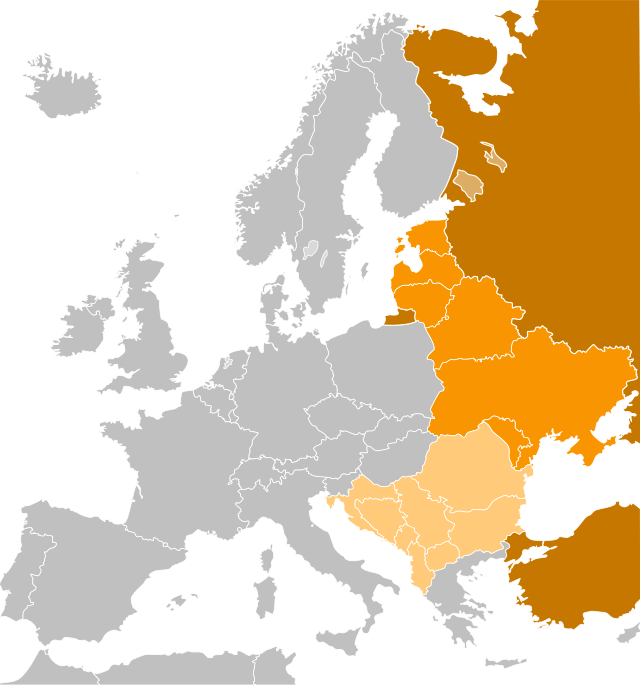Likud political strategist Aron Shaviv talks about V15, the ups and downs of the Likud campaign, and right-wing politics in Central and Eastern Europe.
With the elections over, it's time to take stock of the right's success and failures • Aron Shaviv, political advisor to right-wing parties including Likud and its equivalents in Central and Eastern Europe, sat down with Mida's Elli Fischer • A talk on V15, the Likud campaign and European right-wing politics from the perspective of a practitioner

The elections are over, and the postmortems have begun. While a great deal of attention is understandably focused on Likud’s stunning turnaround during the last 96 hours of the election cycle, campaigns are marathons. There are stories from the ebb and flow of the first four months that lack the drama of the final sprint, but are no less significant.
Before Pesach, Mida’s Elli Fischer sat down with Aron Shaviv, an Anglo-Israeli political strategist who has worked on campaigns on every continent and whose specialty is center-right parties in Central and Eastern Europe. In addition to providing us with an insider’s perspective on the Likud campaign, he is uniquely positioned to offer an international perspective and compare Israel to other states.
The V15 Campaign
The Likud campaign focused a great deal of attention on V15, self-described as a “nonpartisan movement” whose goal was to replace PM Benjamin Netanyahu with new leadership, shining a strong light on the group’s financial ties to OneVoice, a US-based nonprofit that in turn received funding from the US State Department.
Foreign money plays a significant role in Israeli politics today, despite campaign finance laws. There is no doubt that Mr. Netanyahu’s campaign benefitted from the support of Sheldon Adelson and from Yisrael Hayom. This publication, Mida, receives funding from the US-based Tikvah Fund and is unabashedly politically conservative, although nonpartisan. Where is the line drawn? At what point does foreign funding become illegitimate?
The question has to be asked from the perspective of Israeli law and of American law. According to Israeli law, it is illegal to use foreign funding to endorse a party or candidate. V15 technically did not endorse a candidate. They opposed and repudiated Netanyahu, but did not endorse any particular opponent. The truth is, we don’t know yet whether it’s legal under Israeli law. We submitted an inquiry to the State Comptroller’s office, and a ruling will be issued once the next government is set up. If the comptroller decides that this is legal, I doubt there will be an amendment to close this loophole.
If the loophole remains open, it’s going to change everything from now on. Next campaign, you’ll see more and more foreign-funded movements that do not endorse specific candidates but attack opponents. I’m actually thinking of creating a right-wing version for the next elections. Either way, this was V15’s best shot. They were ahead of the curve on this, and they will not have that edge next time.
With regard to American law, as you know, there is currently a Senate investigation into the matter. During the campaign, OneVoice changed its legal status from 501c(3) to 501c(4), which would allow it to retain nonprofit status but engage in limited political activity. This is an indication that they are at least concerned that they may have crossed a line, even after the loosing of restrictions in the wake of Citizens United v. Federal Elections Commission [in which SCOTUS ruled that the restriction of independent political expenditures by non-profit organizations is unconstitutional – EF]. The issue of State Department funding makes it tricky. We know that Sens. Cruz and Zeldin are calling for a probe. We’ll see what happens.

You ran the iVoteIsrael campaign in 2012. [This was a nonpartisan campaign to get American citizens living in Israel to register to vote in the presidential election. The benefactors of the campaign remained anonymous (protected by the organization's 501c(4) status), but it is widely assumed that the money came from Republican boosters. Running a "Get Out the Vote" campaign in an area with low turnout but whose population can be assumed to favor a particular candidate or party can help that party while remaining nonpartisan.] Though you cannot admit it, it is obvious that a GOTV campaign among Americans living in Israel favored Romney, just as it is obvious that a GOTV campaign in Arab areas of Israel would hurt Bibi. What’s the difference?
I think there’s absolutely nothing wrong, and a lot right, with GOTV campaigns. That’s democracy. But there’s a big difference between an American organization trying to get Americans living abroad to vote absentee in an American election, and an American organization trying to get foreign nationals to vote in a foreign election. iVoteIsrael was on foreign soil, but it was entirely American. V15 used American money to interfere in a foreign election.
You have been involved in political campaigns all over the world. Are you familiar with similar efforts by a major power to influence elections? How unique is the case of Israel?
There are attempts to interfere in lots of places. Usually, nondemocratic countries try to influence elections in democratic countries. I had been in touch with a potential client in Taiwan, but we had to walk away because Taiwan has particularly strict laws about outsider involvement in elections. They are understandably concerned about Chinese interference. Russia tries to interfere in elections in the FSU.
In general, these cases are considered an egregious violation of another country’s sovereignty. The case of V15 was different because, since they were exploiting a legal loophole, they wore everything on their sleeves. They didn’t even try to keep their affiliations quiet. That’s probably why they got careless about the issue of using federal funds.
Another difference is that, as far as we know, the American government was not involved in these elections. A nonprofit that has received funding from the State Department was active in the Israeli elections, and that is problematic, but the issue is misuse of government funds. There is nothing that indicates that this was at the behest of the American government.
Usually, when a powerful government interferes in the elections of a smaller country, it does so very loudly or very quietly. In Taiwan, China is quiet. In Hong Kong, where China must approve candidates for chief executive, their involvement is unmistakable. V15 does not have any of the markings of a foreign government’s proxy.
That doesn’t mean that the Obama administration doesn’t want Bibi out—they do. They want someone who will capitulate to international pressure, someone who will play ball with them, someone who will make concessions. People assume that they don’t like Bibi because he’s too far to the right, but that’s not it. His positions are not significantly different from other candidates of from previous prime ministers. But he’s shown the ability to resist international pressure, and that’s what they don’t like.

What went wrong—and right—with the Likud campaign
Getting back to the Likud campaign, the last-minute rally was impressive, but it followed a slow decline in the polls, from a moderately comfortable lead to a real sense that Labor would win by a comfortable margin. Where were you guys until the last week?
The beginning of the campaign was strong. The “Bibi-sitter” commercials went over very well. We were leading for a very long time. We lost momentum when the personal attacks, especially against Sarah, started.
From the beginning, something that concerned us was that while most people wanted Bibi to lead the next government, they felt they could vote for a small party and still get Bibi. In early December, we ran focus groups among people who were planning to vote for Kahlon and Bennett. We posed the following hypothetical: It’s election day. Things are neck-and-neck, and Kahlon hasn’t endorsed anyone. You wake up sick – fever, headache, whatever. What do you do? Over 70% said they would get themselves out of bed to vote for Bibi.
Based on that, we developed a contingency plan in case we start dropping in the polls. We called it “reverse packaging.” If people were thinking they’ll vote Kahlon or Bennett and get Bibi, we wanted them to feel like they can vote for Bibi and get Bennett and Kahlon. In December, we developed the message and put it in our back pockets. The question was if and when to pull the trigger. We decided to pull it after the release of the last polls.
The media started criticizing us for creating hysteria and whatnot, but Netanyahu felt very comfortable executing this strategy because we had tested it and knew it was going to work. At that point, it was all Netanyahu. He stayed on message while giving 40 interviews in 96 hours. I’ve been around a lot of campaigns, and I was very impressed.
Most parties campaigned on economic platforms—lowering the cost of living, lowering housing prices, improving welfare, etc. The Likud did not enter the fray. Why? Netanyahu easily could have criticized Lapid’s moves as Minister of Finance and take credit for ultimately putting the kibosh on misguided policies like 0% VAT on new houses. It was low-hanging fruit. Why not campaign on that?
We believed strongly that the election was ultimately going to break on the classic lines of peace and security, and it ultimately did. This is part of our “reverse packaging.” By the end of the campaign, everyone knew that Kahlon would be part of the next government, and Bibi promised him the Finance Ministry. He was basically saying, look, the next government will have to address the high cost of housing. If that’s your concern, you’re covered, because we’ll include Kahlon. So now you can decide whether you want a right wing or a left wing government.

Had we made housing an issue in our campaign, it would have hurt us. Everyone knows what the solution is: build more houses. There’s no silver bullet and not much difference between parties. Right wing, supply-side economics will prevail. We wanted to move voters to vote based on their political DNA – right wing or left wing on peace and security issues.
Look at Labor. They had a leader, Shelly Yachimovich, who is truly left wing on economic and social issues. And they replaced her with Isaac Herzog, a dove who is not really left wing economically. And then they added Livni, who fits the same profile. It’s pretty clear what the priorities were.
In a sense, Bibi is a victim of his success. Since 2009, when Bibi took office, there has been worldwide economic turmoil and regimes in this region have collapsed. We’ve remained an island of stability through it all, allowing people to worry about things like the price of yogurt.
Shas and Yesh Atid were the big losers of this election, but we did not see much effort to attract votes from the mercurial center or from a splintered Shas that had lost its unifying icon, Rabbi Ovadia Yosef. Why not?
I think we picked up a seat from Shas, but without any targeted messaging. With Yishai in the picture, we didn’t want to go there. We targeted the center by making the election about “us or them,” Bibi or Livni/Herzog. We were pleased that the center shrunk, but it was mainly because we stayed on-message about peace and security.
Likud and the European "Rise of the Right"
We want to draw on your familiarity with European parliamentary politics and understand the degree to which they are comparable to Israeli politics.
Nationalist parties are making a comeback: Front National in France, Jobbik in Hungary, Golden Dawn in Greece, PVV in the Netherlands, and BJP in India to name just a few. Would you consider a resurgent Likud to be part of this global trend?

Absolutely not. Those parties, with the possible exception of BJP, are populist first and right-wing because it plays to popular sentiment. Likud is as mainstream as you can get, and Netanyahu is anything but populist. To understand what I mean by populism, look at the Zionist Union. They promised to eliminate poverty, to give land grants to every young couple. Yesh Atid is extraordinarily populist in its economic offerings, and uses celebrity and charisma to promote its message.
I work with center-right parties, part of nationalist movements, like Likud. I work against the sort of right-wing populist parties you’re describing.
Israelis are most familiar with the political systems of its neighbors and of the United States, and Israel is quite different from all of them. But what about other parliamentary democracies? What’s most comparable to Israel?
The closest actually is one of our neighbors: Cyprus. Like Israel, Cyprus was a British Mandate. Like Israel, it has a significant territorial dispute. In most democracies, the spectrum of right to left is mainly economic. Israel and Cyprus are two of the exceptions. In Cyprus, the right-left division breaks on how to deal with the Turkish claims. The right is less inclined to make concessions, and the left is more inclined. In addition, the parliament is fragmented. There are many small parties.
What about the new democracies of Central and Eastern Europe? Do they have some of the same anxieties about the national character of the state that Israel does? How do they deal with significant native national minorities like Hungarians and Romani in Romania, Russians in the Baltic States, and the like? What about non-native minorities and immigration policy?
A major electoral issue in Lithuania today has to do with the letter “w.” The Lithuanian language has no such letter, but the Polish language does, and there’s a significant minority of ethnic Poles, citizens of Lithuania, who want to use the letter “w” in official documents. It’s a domestic issue there, but it has become a source of tension between Poland and Lithuania.
There is definitely a fault line between the left, which is willing to give up some singularity of identity to be part of Europe, and the nationalist right, which decries the erosion of identity. But minorities are generally well-represented. Hungarians in Romania have their own parties and are represented, so the tensions are not great. The issue arises when a minority separatist movement arises, and it has the backing of a neighbor.
Many Central/Eastern European states have a problem of emigration, not immigration. There’s a brain drain in Romania and Bulgaria, for instance. Elections are about how to keep people there and bring back those who have left. They’re not worried about the immigration of minorities.

It’s the former colonialist powers of Western Europe, the ones who adopted liberal immigration policies as a form of atonement, that are facing the question of widespread immigration, mainly from Muslim countries. Denmark is one of the few countries that has confronted it. They’ve adopted a complex points system for gaining the right to citizenship, even for someone married to a Dane.
The key difference between Israel and Europe in this regard is that in Israel these are purely domestic issues, while in Europe they are domestic as well as multilateral. The policy of one state will affect its relationship with neighbors and with the EU more generally, which they’ve mostly joined. Israel doesn’t have open borders with any of its neighbors, and there is very little migration in either direction. In Europe, people cross borders every day. Israelis are sedentary. Also, none of Israel’s neighbors want to shine too bright a light on how Israel treats its Arab minority, because they know that Arab Israelis don’t want to go anywhere else, that they enjoy greater rights than citizens of any Arab state. Israel’s relations with its neighbors may hinge on the Palestinian issue, but not on the issue of Israel’s Arab minority.
Finally, the question every Israeli worries about: do the goyim like us? Are attitudes about Israel as toxic in Eastern Europe as they are in France and Scandinavia? And on a personal level, do you hide the fact that you are a Jewish Israeli? Has your Jewishness and/or Israeliness been a factor in your career? Has it deterred potential clients or served as ammunition for their opponents?
There’s Classic duality. They appreciate Israel on matters of defense, hi-tech, and brain power. They see it as a successful state worthy of emulation. But there’s still a lot of classic European thinking about Jews, that isn’t pretty.
When I meet a potential client, I start with a joke. A man bangs on his rabbi’s door at 2 a.m. and says that half of his sheep have died. The rabbi retreats to his study and comes back with a solution: separate the males and the females. The next night, the same thing happens: half of the surviving sheep have now died. After further contemplation, the rabbi suggests separating the white sheep from the spotted and speckled sheep. On the third night, the man returns, and once again his flock has been halved. “Got any more ideas, rabbi?” he asks. The rabbi answers, “I have plenty more ideas. The question is: how many sheep do you have left?”
I place the rabbi in the role of strategist and consultant in a light-hearted manner, but also to get the Jewish issue on the table right away. If that’s going to be an obstacle, it’s best to know at the beginning and not down the line.
There is a Slovak politician who has been viciously attacked for his connections to me, and the main problem with me is that I’m Jewish. The politician is not, though he has a Jewish name, the equivalent of Lifschitz. On this site devoted to “exposing” his connections, they allege that I’m an Israeli agent of some sort. They have a picture of me, too. It’s not one of the many pictures that can easily be found on the web, but a picture of me on my wedding day, standing under the chuppah and wearing a kittel. It’s clear what they’re trying to do. I’ll send you the link.
I have my suspicions that I lost potential clients because of my Jewishness, but to be honest, I’m thankful. These are not people I want to work with. So I put my Jewishness out there right away and let the chips fall where they may.
Thanks so much for taking the time. Enjoy your well-deserved Pesach vacation.
To receive updates on new articles in English, join Mida on Facebook or Twitter or join our mailing list.




